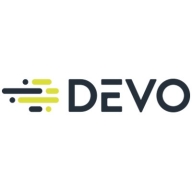

LogRhythm SIEM and Devo offer robust security information and event management solutions. Users favor Devo for its advanced features and overall satisfaction, despite higher pricing.
Features: LogRhythm SIEM is praised for its comprehensive threat detection, response capabilities, and integration flexibility. Devo stands out with strong analytics, scalability, and real-time data processing.
Room for Improvement: LogRhythm SIEM users suggest enhancements in integration flexibility, simpler configuration, and user interface. Devo users note the need for improved documentation, streamlined update processes, and better customer training.
Ease of Deployment and Customer Service: LogRhythm SIEM deployment is considered straightforward but time-consuming, with responsive customer service. Devo's deployment is quick and efficient, with excellent support.
Pricing and ROI: LogRhythm SIEM has lower initial setup costs and satisfactory ROI. Devo, more expensive, is seen as worth the investment due to superior performance and long-term benefits.
The technical support is good; we have a separate portal for partners, and since we are paying for the service, they provide a response timeframe based on severity—critical issues are addressed within four hours, medium issues within one day, and non-urgent issues may take a couple of days.
Customer support is very helpful and effectively solves my problems.
LogRhythm SIEM is scalable; it can handle about 200 or 500 devices without much difference.
The scalability of LogRhythm SIEM is good enough, warranting an eight out of ten rating.
LogRhythm SIEM is highly scalable as it has modular components allowing me to expand storage, indexing, or other resources as needed.
LogRhythm SIEM still needs improvement regarding stability, particularly in environments with heavy data consumption.
The platform needs regular updates to fix problems encountered with each quarterly patch and version release.
Integrations with other sandboxes could be improved to better interpret data using AI and machine learning models.
I have noticed some problems with parsing errors, event mismatches, and data mismatching, so ensuring accurate parsing and continuous improvement according to device updates are my basic expectations as a detection engineer.
There is currently no way to determine how much data is being consumed in terms of gigabytes, terabytes, or petabytes from particular devices or environments.
A more user-friendly user interface with drag-and-drop features, similar to key competitors like Splunk, would be beneficial.
I find LogRhythm SIEM affordable, as it is a bit less costly than QRadar.
The license cost is around $10 per MPS.
When they see a spike in a line chart for a failed login, which could be a true or false attempt, they can click that spike, and a table widget on the same active board instantly populates with raw logs of data for those specific failed logins.
We have enough budget for cloud deployment, but we choose to keep it on-prem to ensure data privacy; cyberattacks are a concern, but data privacy is the foremost priority due to sensitive government information.
The seamless integration for case management, along with a user-friendly dashboard user interface, makes tasks like threat hunting more efficient.
This helps SOC analysts significantly as they can monitor all log sources through a dashboard, quickly identifying which sources haven't reported within their specified timeframes.
| Product | Market Share (%) |
|---|---|
| LogRhythm SIEM | 2.6% |
| Devo | 1.1% |
| Other | 96.3% |
| Company Size | Count |
|---|---|
| Small Business | 8 |
| Midsize Enterprise | 4 |
| Large Enterprise | 11 |
| Company Size | Count |
|---|---|
| Small Business | 38 |
| Midsize Enterprise | 38 |
| Large Enterprise | 83 |
Devo is the only cloud-native logging and security analytics platform that releases the full potential of all your data to empower bold, confident action when it matters most. Only the Devo platform delivers the powerful combination of real-time visibility, high-performance analytics, scalability, multitenancy, and low TCO crucial for monitoring and securing business operations as enterprises accelerate their shift to the cloud.
LogRhythm SIEM Platform is an award-winning platform in security analytics. With more than 4,000 customers globally, LogRhythm SIEM is an integrated platform that helps security operations teams protect critical infrastructure and information from emerging cyberthreats. Ultimately, LogRhythm SIEM is an integrated set of modules that contribute to the security team’s fundamental mission: rapid threat monitoring, threat detection, threat investigation, and threat neutralization. LogRhythm SIEM is for organizations that require an on-premises solution and offers:
● Streamlined workflow
● Secure data access
● Real-time visibility
● A unified user experience
● Management customization
Security information and event management (SIEM) solutions have been evolving for over a decade; their core functionality still acts as the most effective foundation for any organization’s technology stack. A SIEM solution enables an organization to centrally collect data across its entire network environment to gain real-time visibility into activity that may pose a risk to the organization. SIEM technology addresses threats before they become significant financial risks while simultaneously helping better manage an organization’s assets.
LogRhythm SIEM has many key features and capabilities, including:
● High-Performance Log Management: LogRhythm SIEM offers structured and unstructured search capabilities which allows users to swiftly search across an organization’s vast data to easily find answers, identify IT and security issues, and troubleshoot issues. Users can efficiently process and index terabytes of log data daily.
● Network and Endpoint Monitoring: Forensic sensors allow users to gain deep visibility into endpoint and network activity. Users can see behavioral anomalies and better respond to incidents.
● SmartResponse™ Automation: LogRhythm SIEM allows users to centrally execute pre-staged actions that automate incident investigatory tasks and responses.
● Automated Machine Analytics: LogRhythm SIEM's AI Engine continuously analyzes all collected security incidents and forensic data. Security teams are delivered precise, real-time intelligence about risk-prioritized threats.
● Case and Security Incident Management: LogRhythm SIEM offers an integrated workflow so that threats don’t slip through the cracks. Collaboration tools help centrally manage and track investigations.
● User and entity behavior analytics (UEBA): Embedded deterministic UEBA monitoring helps protect against insider threats.
● Security orchestration, automation, and response (SOAR): LogRhythm SIEM includes our embedded SOAR solution to increase efficiency and higher-quality incident response with low mean time to response (MTTR).
Benefits to Using LogRhythm SIEM
● The platform offers great value to security and IT operations. Users have the ability to map their security and IT operations to existing frameworks such as NIST and MITRE ATT&CK.
● The platform offers broad integration across security and IT vendors: Users benefit from support for integration with hundreds of security and IT solutions. In turn, this further extends SIEM capabilities and data collection.
● The platform provides compliance adherence, enforcement, and reporting: The prebuilt compliance modules automatically detect violations as they occur and remove the burden of manually reviewing audit logs.
Reviews from Real Users
LogRhythm SIEM stands out among its competitors for a number of reasons. Two major ones are its ability to be customized and its quick performance of queries.
Jason G., a senior cybersecurity engineer, writes, "I have found the Advanced Intelligence Engine has provided the most value to us because we can customize alarms based on our requirements and have created hundreds of alarms that notify different people for different scenarios."
Andy W., principal consultant at ITSEC Asia, notes, “LogRhythm SIEM covers all our primary security analysis needs. It makes it easier for us to analyze threats and improves our response times. It's a versatile platform that performs queries fast compared to other SIEM solutions.”
We monitor all Security Information and Event Management (SIEM) reviews to prevent fraudulent reviews and keep review quality high. We do not post reviews by company employees or direct competitors. We validate each review for authenticity via cross-reference with LinkedIn, and personal follow-up with the reviewer when necessary.